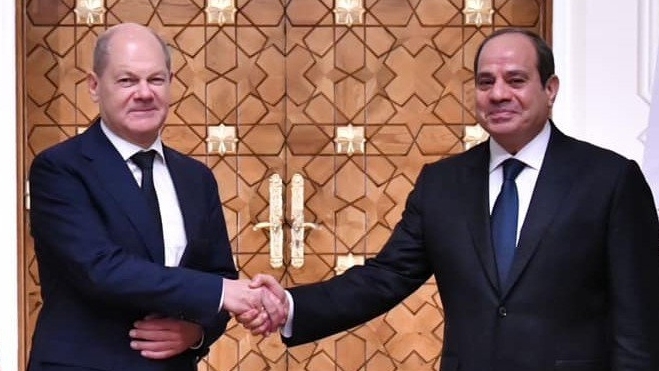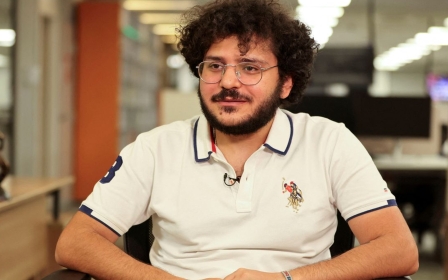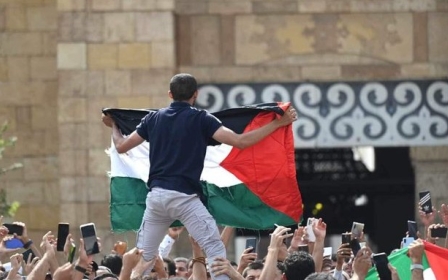Israel-Palestine war: Sisi says Israel can transfer Palestinians in Gaza to Negev desert

Egypt’s President Abdel Fattah el-Sisi on Wednesday declared his government’s rejection of the forced transfer of Palestinian civilians from Gaza into Sinai, suggesting Israel could instead relocate them to the Negev desert.
The statements come as Israeli air strikes continue to bombard civilian buildings and infrastructure in the besieged Gaza Strip for the 12th day, with the latest attack targeting a hospital on Tuesday killing at least 471 civilians, both patients and displaced people.
Palestinians and Egyptian officials have rejected the prospect of relocating Gaza residents to Sinai, warning it would constitute a second Nakba, or another ethnic cleansing of Palestinians.
During a joint press conference with German Chancellor Olaf Scholz at Cairo’s Ittihadeya palace on Wednesday, Sisi responded to Israeli proposals for Palestinian civilians to relocate to Egypt’s Sinai peninsula, on the border with Gaza.
“If there is an idea for transfer, there is the Negev Desert in Israel. It is entirely possible to transfer Palestinians until Israel completes its declared mission of eliminating resistance or armed groups such as Hamas, Islamic Jihad, and others in the Gaza Strip. Then, they can be returned if [Israel] desires,” Sisi said in comments that were not in the official speech published by the presidency spokesman.
Stay informed with MEE's newsletters
Sign up to get the latest alerts, insights and analysis, starting with Turkey Unpacked
“But transferring them to Egypt? This military operation could take years and is a risky endeavour. I must emphasise that we have not yet eradicated terrorism; we have not completed our mission.
“Egypt will bear the consequences of this, and Sinai may turn into a base for terrorist operations against Israel. We, in Egypt, will be responsible for that, and all the peace we have worked for will fade away as part of an idea to resolve the Palestinian issue.”
The president also warned that "millions" of Egyptians will protest against any displacement of Palestinians to Sinai.
Egypt has closed the Rafah border crossing in the aftermath of several Israeli air strikes that targeted it over the past 10 days. The crossing is the only exit for Palestinians in Gaza that is not controlled by Israel. It is a vital humanitarian aid corridor for the besieged civilians of Gaza.
Follow Middle East Eye's live coverage for the latest on the Israel-Palestine war
However, Sisi on Wednesday denied the crossing had been closed, saying that "the developments on the ground and the repeated Israeli strikes on the Palestinian side of the crossing obstructed its operation".
He added that his government rejects "any attempts to forcibly displace the Palestinians from their land, or for this to happen at the expense of countries in the region". The statement echoed similar remarks last week in which he urged people in Gaza to "stay steadfast and remain on their land".
The latest round of hostilities between Israel and Palestinians in Gaza started when Hamas launched a surprise multi-front assault on Israeli communities on 7 October, firing thousands of rockets and sending fighters into Israel by land, air and sea. At least 1,400 Israelis have been killed in the incursion, including civilians and soldiers, and 199 people taken captive back to Gaza.
Israeli forces have responded by raining down a barrage of air strikes on the Gaza Strip, killing at least 3,478 Palestinians, more than a thousand of them are children.
Meanwhile, Israel has amassed tanks near the boundary with Gaza ahead of an expected ground invasion of the enclave - the first such incursion in more than nine years.
The Israeli army on Friday said that civilians in the north of Gaza must leave southwards, and that they would not be allowed to return "until we say so". However, civilians were still targeted by Israeli air strikes as they attempted to flee to the south.
Since 1948, Israel has prevented Palestinian refugees, who were expelled by Zionist militias prior to the establishment of Israel, from returning to their native land. Currently, the estimated count of Palestinian refugees stands at more than 5.6 million.
In 1967, Israel occupied the last 20 percent of historic Palestine, encompassing the Gaza Strip, East Jerusalem, and the West Bank. This prolonged occupation has evolved into a system that experts from the United Nations and human rights organisations characterise as apartheid.
Middle East Eye delivers independent and unrivalled coverage and analysis of the Middle East, North Africa and beyond. To learn more about republishing this content and the associated fees, please fill out this form. More about MEE can be found here.





